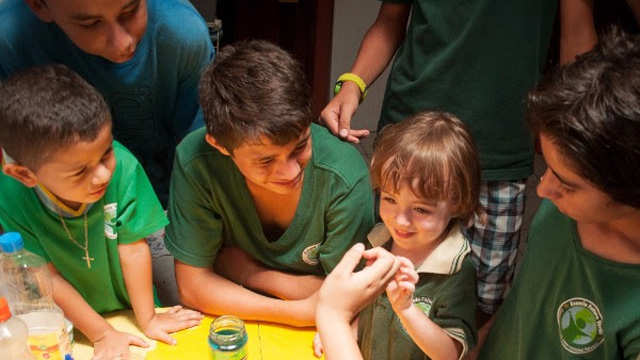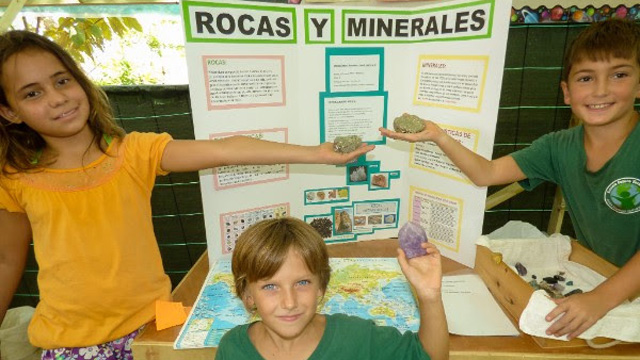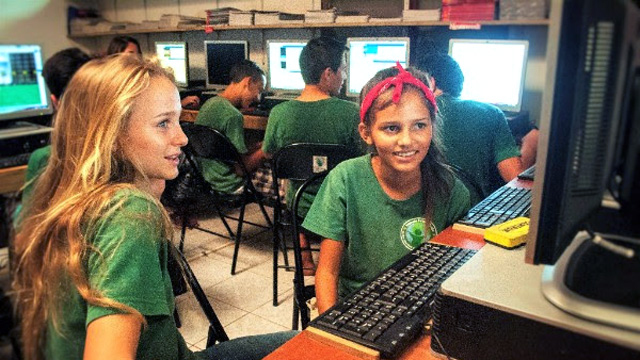
by Stuart Millar, IB coordinator | Feb 20, 2016

Every month Futuro Verde focuses on one of the values or elements of our learner profile. The first month of the school year sees a focus on risk-takers, while in March we will turn our attention to inquirers. These descriptors are often taken in isolation, but very often a student will display these in combination – inquirers can be risk-takers.
Inquirers are curious, they ask questions and love to find things out. A survey by British retailer, Littlewoods, showed what most parents of young children know. They ask a lot of questions – four year old girls asking the most at nearly 400 questions a day!(1) What was noticeable from the results was that the number of questions asked per day by children decreased drastically as they matured. In his Ted Talk, Do schools kill creativity?, Ken Robinson discusses how young children aren’t afraid to have a go, take a risk, ask questions and be creative. Importantly he goes on to comment that as children grow to be adults they lose that ability to take a chance and risk being wrong(2).
There are probably many different reasons children ask fewer questions as they mature, but traditional education may be to blame. Traditionally we don’t teach students how to ask questions, questioning is the teacher’s job and students are there to provide answers. Asking questions can also be seen as a lack of knowledge and a sign of weakness. Students don’t like to admit that they don’t know things. Why risk being ridiculed by your classmates?
What can parents and teachers do to make sure their students maintain and develop their childhood curiosity? Parents, it’s easier said than done, but: be interested in your child’s questions; answer them whenever you can; if you don’t know the answer, help them research. Nurture your child’s natural-born questioning skills. Teachers, some personal reflection might be needed. Who is asking all the questions in your classroom? A shift might be needed from where the lecturer asks the questions and delivers the information, to where you as the coach/facilitator assists the students in their own, individual lines of inquiry. Teach questioning skills. Don’t assume students know how to form open or closed questions. Finally, evaluate your classroom culture; is it a safe place for students to take a risk and ask questions? Some classroom rules and expectations might be needed.
Our learner profile expects our students to be inquirers and risk-takers, but they need parent and teacher support to be successful.
References:
(1) “Why Is Water Wet?” Reuters. Thomson Reuters, 28 Mar. 2013. Web. Retrieved 03 Feb. 2016.http://www.reuters.com/article/idUSnMKW103a 70 MKW20130328.
(2) “Do Schools Kill Creativity?” Ken Robinson:. Feb. 2006. Web. Retrieved 03 Feb. 2016.https://www.ted.com/talks/ken_robinson_says_schools_kill_creativity?language=en
Burger, W. “5 Ways to Help Your Students Become Better Questioners.” Edutopia. 2014. Web. Retrieved 03 Feb. 2016. http://www.edutopia.org/blog/help-students-become-better-questioners-warren-berger
Burger, W. “How Can We Teach Kids to Question?” A More Beautiful Question by Warren Berger. 2014. Web. Retrieved 03 Feb. 2016. http://amorebeautifulquestion.com/can-teach-kids-question/

by Stuart Millar, IB coordinator | Feb 20, 2016

The Role of Parents and Guardians
Through inquiry and critical thinking, Futuro Verde students develop their knowledge. They produce authentic work in the form of presentations, projects and written assignments to further solidify and demonstrate this knowledge. Inspired by the International Baccalaureate (IB) application process, as well as our values and learner profile, Futuro Verde is focusing on academic honesty.
Academic honesty occurs where principled learners, acting with integrity, honesty and respect for others, produce authentic work which properly acknowledges their sources and the intellectual property of others. Put simply – students produce work based on their own ideas, using their own words. Where they do not use all their own ideas and words they must properly show the source of their content.
Parents play a major role in ensuring that their students are academically honest and produce authentic work. Think about the example you are setting and remember that it is best if good habits start early! We often see cheap DVDs for sale in the street – buy them and you are supporting the theft of intellectual property. Suggesting your child copy from a book or website to help them get the project they left to the night before finished? Plagiarism. Writing some words on their project for them, drawing part of their art project? Collusion. Be careful that parent/guardian help does not go too far and become doing. If your student appears to need that much help then perhaps they are attempting something they are not yet ready for? Help them by trying to simplify the task. Instill and develop positive and honest study skills in your children: remind them to put the information in their own words; encourage them to keep a list of the websites they visit during the research phase; suggest they use an online plagiarism checker (links in the student planner). If your elementary student asks you to be too involved, or if you see your secondary student using copy and paste, maybe gently ask, “Are you going to put your name on that project? Only your name? Then it should only be your own work.”
Information regarding the school academic honesty policy can be found in the school handbook, along with some helpful hints and reminders in the student planners. In addition, teachers will provide continuous coaching and support to ensure student success.

by Stuart Millar, IB coordinator | Feb 20, 2016

On March 1st, Futuro Verde will officially be considered an IB candidate school* for the Diploma Programme. During the next few months a variety of things will be happening as we move towards the next deadline, 1st October, and the submission of our application for authorization. Futuro Verde will be working with a consultant, provided by the IB Organization, who will provide remote consultation as well as come for a two-day on-site consultation visit.
A committee, to be led by Stuart Millar (IB Coordinator designate) will work together to ensure the application is completed to the best of our ability, to give us as much chance of success as possible. Head of school training, IB Coordinator training, Theory of Knowledge (TOK) teacher training have already been completed, with teacher training in Business Management, Biology and the other IB diploma subject areas scheduled to take place in the next few months. In conjunction with these subject specific workshops, teachers will also have access to the IB online curriculum center as they work towards completing their course descriptions which will be included in the application.
As always, if you have any questions or concerns regarding our application or the IB diploma programme in general, please do not hesitate to contact Stuart at stuart@futuro-verde.org
*Only schools authorized by the IB Organization can offer any of its four academic programmes: the Primary Years Programme (PYP), the Middle Years Programme (MYP), the Diploma Programme or the Career-related Programme (CP). Candidate status gives no guarantee that authorization will be granted.
For further information about the IB and its programmes, visit http://www.ibo.org






